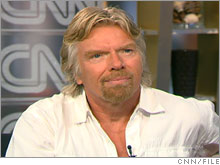|
A British Invasion?
How the investors behind Virgin America airlines plan to cash in.
(FORTUNE Magazine) - You know the old line: How do you end up with $500 million in the airline business? Start with a billion. These days the question should be, How do you end up with $250 million? Or nothing at all? The airline business's butt-ugly operating environment--overcapacity, record fuel prices, enraged unions--has shown few signs of improving. And yet, stranger than fiction, I recently spoke with a couple of very successful, sharp-pencil investors who've just plunked down $89 million between them for--of all things--a startup domestic airline. It's not your average startup. The new carrier, Virgin America, has one of the most recognized brands on the planet attached to it. Virgin is the umbrella name for all the businesses owned by or--as in this case--minority-owned by Sir Richard Branson. The shaggy entrepreneur, whose companies have sunk some $80 million into Virgin America, has long stated his ambition to have an airline in the U.S. But antiquated laws mandate that to operate domestically, an airline must be majority-owned by U.S. interests. So last year Branson contracted with Lazard to find him partners stateside. The Lazard bankers started by assembling a management team, led by Fred Reid, the former president and COO of Delta, who created that airline's low-cost carrier-within-a-carrier, Song. (Delta is reabsorbing its offspring in May.) Reid is now Virgin America's CEO. Other VA execs have done time at AirTran, US Airways, and ESPN (that would be your VP of marketing).
Once the operational team was in place, the Lazard bankers and Branson looked for backers. They ended up going with two investment firms, Cyrus Capital in New York, whose founders came from hedge fund Och-Ziff, and Black Canyon Capital in L.A., which was started by alumni of Drexel Burnham Lambert's famed Beverly Hills office. Mark Lanigan of Black Canyon is chairman of Virgin America. Okay. Simple question for the chairman: In 2006, why would anybody throw perfectly good money at an airline? Lanigan chuckles. "Demand for air travel continues to increase, yet you look at the top ten airlines in this country, and customers will tell you that eight out of ten don't offer an adequate value proposition," he says. "Low-cost carriers starting from scratch offer such significant cost advantages that their share has grown to 30% today. That will continue to climb, and we will be one of those players." How specifically will Virgin America--whose headquarters are in San Francisco--fly cheaper than the legacy carriers? Pretty much the same way Southwest (Research) and JetBlue (Research) do it. Those are two names Lanigan and Reid cite early and often. Virgin America will first fly long-haul routes like JetBlue and probably match that carrier's fares. "We will be flying one plane type, the Airbus 320," says Reid. "We'll use cutting-edge technology for reservations and systems. We will have simple fares. We will outsource assets like hangars instead of owning them. And we will have great service." And TVs at every seat? "And TVs at every seat," promises Reid. "And more." Sounds like fun, but will Cyrus and Black Canyon make any money on the deal? A source familiar with the transaction points to the returns generated by JetBlue for early investors, including George Soros and J.P. Morgan (Research). In 1998 the initial investors put $128 million into JetBlue, then private, at a cost of $5.27 a share. In 2002, JetBlue went public at $27 a share, giving the investors a fivefold-plus return. (The airline just reported its first quarterly loss since its IPO, in part because of high fuel costs, and the stock is now back down to roughly its opening-day price, adjusted for splits.) So when does Virgin America take off? Don't fasten your seatbelts quite yet. Virgin America submitted its application to the Department of Transportation in December and has yet to hear back. Delays may be due to complaints by competitors such as Continental, which asked whether Virgin America is really majority U.S. controlled or just a front for Branson. A document filed with the DOT by Continental--and seconded by Delta, American, and others--questioned "the applicants' bald assertion that Virgin America qualifies as a U.S. citizen." Memo to Continental and other threatened U.S. carriers: Stop whining and let Virgin fly!
ANDY SERWER, editor at large of FORTUNE, can be reached at aserwer@fortunemail.com. Read him online in Street Life on fortune.com and watch him on CNN's American Morning and In the Money. |
|

